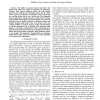Free Online Productivity Tools
i2Speak
i2Symbol
i2OCR
iTex2Img
iWeb2Print
iWeb2Shot
i2Type
iPdf2Split
iPdf2Merge
i2Bopomofo
i2Arabic
i2Style
i2Image
i2PDF
iLatex2Rtf
Sci2ools
134
Voted
ICRA
2009
IEEE
2009
IEEE
Temporal stabilization of discrete movement in variable environments: An attractor dynamics approach
The ability to generate discrete movement with distinct and stable time courses is important for interaction scenarios both between different robots and with human partners, for catching and interception tasks, and for timed action sequences. In dynamic environments, where trajectories are evolving on-line, this is not a trivial task. The dynamical systems approach to robotics provides a framework for robust incorporation of fluctuating sensor information, but control of movement time is usually restricted to rhythmic motion and realized through stable limit cycles. The present work uses a Hopf oscillator to produce discrete motion and formulates an on-line adaptation rule to stabilize total movement time against a wide range of disturbances. This is integrated into a dynamical systems framework for the sequencing of movement phases and for directional navigation, using 2D-planar motion as an example. The approach is demonstrated on a Khepera mobile unit in order to show its reliabilit...
| Added | 19 Feb 2011 |
| Updated | 19 Feb 2011 |
| Type | Journal |
| Year | 2009 |
| Where | ICRA |
| Authors | Matthias Tuma, Ioannis Iossifidis, Gregor Schöner |
Comments (0)

